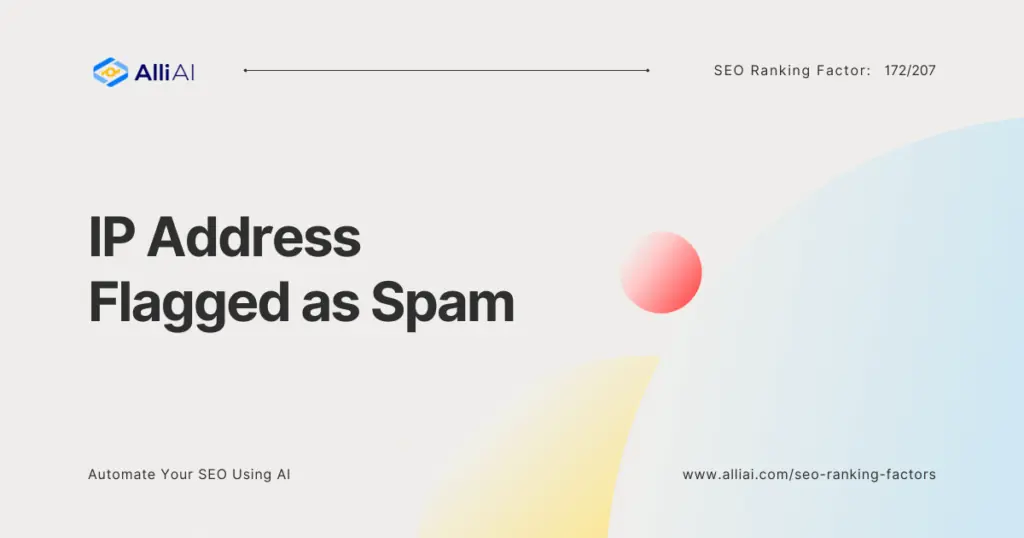What is IP Address Flagged as Spam?
An IP address flagged as spam refers to the situation where an IP address gains a negative reputation due to associated unethical activities like sending unsolicited bulk emails (spam), hosting malicious content, or other spam-related behaviors. It’s akin to getting a bad mark on your personal record that signals to others to be wary of interacting with you.
When an IP address is flagged as spam, it means that it has been added to a blacklist—a database of IP addresses identified as sources of spam by various Internet service providers (ISPs) and email service providers (ESPs). This can severely affect the deliverability of emails and the credibility of websites associated with the affected IP address.
Imagine you live in a neighborhood, and one of your neighbors gets caught frequently hosting loud, disruptive parties until late at night. Consequently, this neighbor gets a reputation in the community for being a disturbance. Just like how this neighbor’s actions affect how they are viewed by the community, an IP address’s reputation can be tarnished if it is associated with spam, affecting how it is treated by ISPs and ESPs.
Why is IP Address Flagged as Spam important in SEO?
The reputation of an IP address is critical in Search Engine Optimization (SEO) because it can directly impact a website’s visibility and its ability to communicate with its customers via email. If search engines detect that your website is associated with a negatively flagged IP address, they may deem your site less trustworthy, which can adversely affect your site’s ranking. Moreover, emails from your domain may not reach your audience, reducing effective communication and potentially harming your business relationships and conversions.
How IP Address Flagged as Spam affects SEO?
An IP address’s reputation is crucial for SEO because it directly influences email deliverability and a website’s perceived trustworthiness, both of which can significantly impact search rankings.
- Impact on Email: If your website shares an IP address with spammers, even your legitimate emails might land in spam folders or be blocked entirely. Studies indicate that roughly 21% of permission-based emails never reach their intended recipients due to factors like poor IP reputation.
- Search Engine Trust: Search engines may view websites associated with spam-flagged IP addresses as less trustworthy, potentially hindering their rankings.
Prevention: Technical Best Practices
- Authentication Practices: Implement email authentication protocols like SPF (Sender Policy Framework), DKIM (DomainKeys Identified Mail), and DMARC (Domain-based Message Authentication, Reporting, and Conformance). These help ISPs verify your email legitimacy.
- Responsible Email Conduct: Always obtain explicit permission before adding users to email lists, avoid sending mass unsolicited emails, and maintain a consistent and reasonable sending volume.
What to Do if You’re Flagged
- Identify the Source: Investigate your email practices and website content to pinpoint the cause of the flagging.
- Request Delisting: Follow the removal processes outlined by the specific blacklist(s). Some may have direct request forms, while others may require contacting them or utilizing a removal service.
- Prevent Recurrence: Proactively implement the best practices mentioned above to secure your IP reputation.
FAQ
How can I check if my IP address is flagged as spam?
You can check if your IP address is flagged by using online tools such as MXToolbox, Spamhaus, or MultiRBL. These services check your IP against multiple blacklists and provide a report on its status.
How can I prevent my IP address from being flagged as spam?
To prevent your IP from being flagged, engage in best email practices such as obtaining express permission before sending emails, avoiding sending bulk unsolicited emails, and keeping a healthy email sending volume. Additionally, regularly monitor your IP reputation using trusted tools and services.
What should I do if my IP address is flagged as spam?
If your IP address is flagged as spam, first identify the cause of the flagging by reviewing your recent activities. Then, request removal from the blacklist by following the specific process provided by the listing service. In some cases, you may need to reach out directly or use a removal service. Consistently adhere to best practices to avoid future flaggings.
Conclusion
An IP address flagged as spam can severely impact your SEO efforts and email deliverability, reducing your reach and hindering your digital marketing strategies. Understanding the implications, actively monitoring your IP status, and adhering to email best practices are crucial steps to protecting and enhancing your online presence. By taking proactive measures against spam flagging, businesses can improve their reputation, ensure their communications reach their audience, and maintain and improve their SEO standings.






